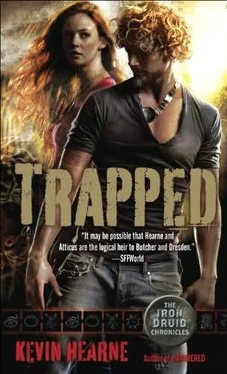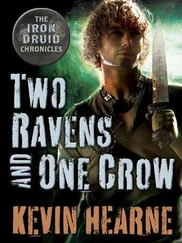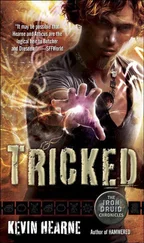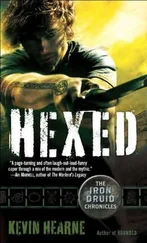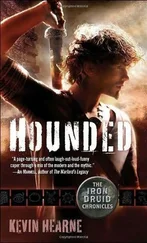Granuaile petted him and looked over at me. “Where to now?”
“Well, if I’m right, there’s a sort of graduation present waiting for you in Tír na nÓg.”
“An envelope filled with cash and a card signed by all the Tuatha Dé Danann?”
I snorted. “No, something a bit more epic.”
The proud grin on Goibhniu’s face could have lit up Broadway. He placed a work of art into Granuaile’s outstretched hands and said, “This is Scáthmhaide.”
Granuaile admired it in silence for a few moments, her mouth open and her eyes wide in shock. It was a beautifully wrought staff of oak, carved with knotwork beyond my ken.
Luchta, watching her over Goibhniu’s shoulder, asked, “Why doesn’t she say anything?”
“Silence is the perfectest herald of joy,” I said.
I was quoting Shakespeare, Oberon; therefore, it’s allowed .
A giggle blurted out of Granuaile before she could hold it in, and she blushed.
“Sorry. I was laughing at something the hound said.”
Goibhniu and Luchta nodded in understanding.
“It’s wonderful,” she added, and it was. Flush with the wood, the Celtic bindings for strength and speed were carved and inlaid with iron on one end and with silver on the other. The metal was not raised in a ridge or nestled in a valley; it would contact the target at the same time as the wood around it. In this way the craftsmen had created a weapon that would be lethal to Fae, Bacchants, and werewolves, and the bindings meant that Granuaile would enjoy enhanced strength and reflexes while wielding it—even when separated from the earth for a time. It functioned much like my bear charm did: It stored up magic while Granuaile was in contact with the earth and then shared it when she wasn’t.
“Unbreakable, o’ course,” Luchta said. “And waterproof.”
“The iron won’t rust and the silver won’t tarnish,” Goibhniu added.
“Amazing,” Granuaile said. “But what are all these bindings here along the length of the staff? Atticus, do you recognize them?”
“That’s actually Flidais’s work,” Luchta explained. “Or, rather, it’s my work but her bindings. They’re the reason for the name: Scáthmhaide means ‘shadow staff’ in modern Irish. Say the proper words and it’ll turn ye invisible. True invisibility, now, not camouflage. There’s some fine print, but I don’t know it all. I just carved it according to instructions. You’d best talk to Flidais about it.”
Granuaile was stunned. “Flidais did this for me?” The craftsmen nodded. “Why?”
“Wish I knew the answer to that meself,” Goibhniu said. “She hasn’t taught that binding to anyone else, ye know.”
“Aye, and everyone from Brighid to brownies a’beggin’ fer it,” Luchta said.
“But now you know it, right?” Granuaile pointed to the knots.
“Nope. She’s got all kinds o’ stuff going on there. I don’t know which part of it is invisibility and which is pure decoration. I imagine it all accomplishes something, but these aren’t standard bindings. They’re unique. Ye have something truly special there.”
Granuaile remembered not to thank them directly. “You do me great honor. I will do my best to live up to it.”
“Attagirl,” Luchta said.
“Shall we have a drink to celebrate?” Goibhniu asked. “I happened to bring a few bottles along.”
We were at Luchta’s studio, one of the most pleasant work spaces I have ever visited: sawdust on the floor, milled wood stacked against one wall along with shelves of burls and knots and branches, and polished finished pieces resting against another. We were near the workbenches, where lathes and chisels and peelers awaited the attention of Luchta’s expert hands. The smells of pine and cedar and aged oak filled the space, and these were much more agreeable to everyone’s nose than rhino shit.
We had made a brief stop at Manannan Mac Lir’s estate to clean up and get a fresh set of clothes. We looked more old-fashioned Irish now than modern American, wearing tunics and pants in his blue-gray color palette. Manannan gave Granuaile a silver belt of cockleshells and sea horses as a sort of graduation gift and made much ado about the strength of her animal forms. Fand gave her some silvery hair-clip thingies and some cookies that may have been magical. Oberon and I got ignored; they didn’t remember I was there until I said we had to get going to Luchta’s.
Granuaile had her hair all brushed out and shining with silver bits, and I wasn’t the only person at Luchta’s shop to think she looked like a goddess. A large shadow darkened the doorway and a deep voice called, “Flidais! You are even more fetching than usual today!”
Granuaile turned toward the voice and discovered Ogma there, who blanched once he realized his mistake.
“Oh! I beg your pardon,” he said, a flush coloring his cheeks. “I meant no offense.”
“No offense taken, sir,” Granuaile said, casting her eyes sideways at me with a tiny smirk. “There are worse fates than to be mistaken for a renowned beauty.”
Ogma smiled. “I see you are now bound to the earth. Congratulations. And you have a new weapon—congratulations on that also. Are you anxious to try it out?”
“I am, actually,” Granuaile replied, casting an admiring glance at Scáthmhaide.
“Shall we have a friendly sparring match, then?”
“How friendly?”
“Say, two falls out of three. Winner takes clothing.”
Granuaile raised an eyebrow and replied, “Done,” before I could counsel her not to. Ogma was a famed champion of the Tuatha Dé Danann, brother to the Dagda, half-brother to Lugh, and grandfather of the Three Craftsmen. He used to take care of the king’s problems; the rumors of his demise in some tales were greatly exaggerated. He was too much of a badass to die. Nuada Silver-Hand, the old king of the Tuatha Dé Danann, used to point at this unbeatable monster or that unstoppable atrocity and tell Ogma to wreck it, and it would be wrecked. One day he said, damn it, Ogma, the Irish need a writing system, and Ogma came up with Ogham script. Granuaile probably knew all this, however, and had decided to accept anyway. The time for me to offer unsolicited advice was over.
Ogma, again dressed only in a kilt, muscles rippling with every movement, asked Luchta if he could borrow a staff. He was much taller than anyone, and his reach far exceeded Granuaile’s. Granuaile moved to the far side of the workshop, choosing her spot in the sawdust. She twirled it about experimentally, getting used to its weight and length. These twirls gradually grew faster until the staff blurred like a propeller blade.
Ogma stepped through some of his own warm-up exercises, twirling his staff in one hand at such speeds that Granuaile’s hair was blown back a bit. He wasn’t one to be psyched out.
Well, not with words, anyway.
As part of Granuaile’s training in martial arts, I taught her to take advantage of men’s weaknesses prior to the first strike.
If her opponent was a patriarchal, misogynist asshole, she could taunt him into a rash attack by the simple expedient of calling him a bitch; the same man could be set off his guard by feigned displays of fear.
Ogma wasn’t that type, and indeed it would have been difficult to find any of that sort amongst the Tuatha Dé Danann, who had comfortably accepted Brighid’s dominance for centuries.
Читать дальше
